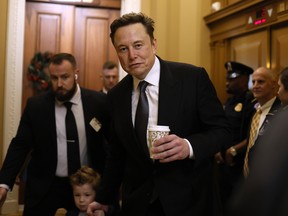The past 10 years have seen the regulatory burden on business expand rapidly. No wonder productivity has grown so slowly
Article content
By Kenneth Green
Article content
Article content
Canada has a regulation problem. Our economy is over-regulated and the regulatory load is only growing. To reverse this trend and free up the Canadian economy, we need a deregulation agenda that will cut red tape and government bloat. A Department of Government Efficiency (DOGE), like the one Elon Musk and Vivek Ramaswamy are heading up for United States president-elect Donald Trump, could help.
Advertisement 2
Article content
According to the latest red tape report from the Canadian Federation of Independent Business, regulations cost Canadian businesses a staggering $38.8 billion in 2020. In total, businesses spent 731 million hours on regulatory compliance — equivalent to nearly 375,000 full-time jobs. Canada’s smallest businesses bear a disproportionately high burden, paying up to five times more for regulatory compliance per employee than larger businesses — $7,023 per employee per year on average versus $1,237.
In its almost 10 years in office, the Trudeau government has imposed new regulations across a wide swath of Canada’s economy — but particularly in the energy sector — in its quest to make Canada a “net-zero” greenhouse gas (GHG) emitter by 2050, whether by eliminating fossil fuel generation or offsetting emissions with tree-planting and other such activities.
Some examples: The government introduced very subjective criteria — including the “gender implications” of projects — into the evaluation of energy projects. It established EV mandates requiring all new cars be electric by 2035. And it has imposed new “Clean Electricity Regulations” with the goal of further reducing the use of fossil fuels in generating electricity. Their cost is unknown but seems certain to hit provinces, like Alberta, that rely more on fossil fuels to generate electricity.
Article content
Advertisement 3
Article content
Meanwhile in the United States, DOGE is thinking big, seeking up to US$2 trillion in efficiencies. As Musk and Ramaswamy recently wrote in the Wall Street Journal: “A drastic reduction in federal regulations provides sound industrial logic for mass head-count reductions across the federal bureaucracy … The number of federal employees to cut should be at least proportionate to the number of federal regulations that are nullified: Not only are fewer employees required to enforce fewer regulations, but (federal agencies) would produce fewer regulations once (their) scope of authority is properly limited.”
If Musk and Ramaswamy achieve these goals, the U.S. could leap even further ahead of Canada in terms of regulatory efficiency, making Canada’s economy even less competitive than it is today. Between 2000 and 2023, Canada’s GDP per person (an indicator of incomes and living standards) lagged far behind the average among G7 countries. Business investment is also lagging. Between 2014 and 2021, business investment per worker (inflation-adjusted, excluding residential construction) decreased by $3,676 (to $14,687) while it increased by $3,418 (to $26,751) per worker in the U.S. And over-regulation is partly to blame.
Advertisement 4
Article content
Recommended from Editorial
-

Could U.S. odd couple unleash a small-government revolution?
-

Lessons for Canada in Argentina’s newly freed markets
-

Small business investment set to shrink
For 2025, Canada needs a deregulatory agenda similar to DOGE’s that will allow Canadian workers and businesses to recover and thrive. It can be done. A deregulatory effort in British Columbia, including a minister of deregulation, produced a 37 per cent reduction in regulatory requirements between 2001 and 2004. The federal government should learn from B.C.’s success at slashing red tape and reduce the burden of regulation across the entire Canadian economy.
Kenneth Green is a senior fellow at the Fraser Institute.
Bookmark our website and support our journalism: Don’t miss the business news you need to know — add financialpost.com to your bookmarks and sign up for our newsletters here.
Article content
We need our own ‘DOGE’ to unleash the Canadian economy
2025-01-16 11:00:48








